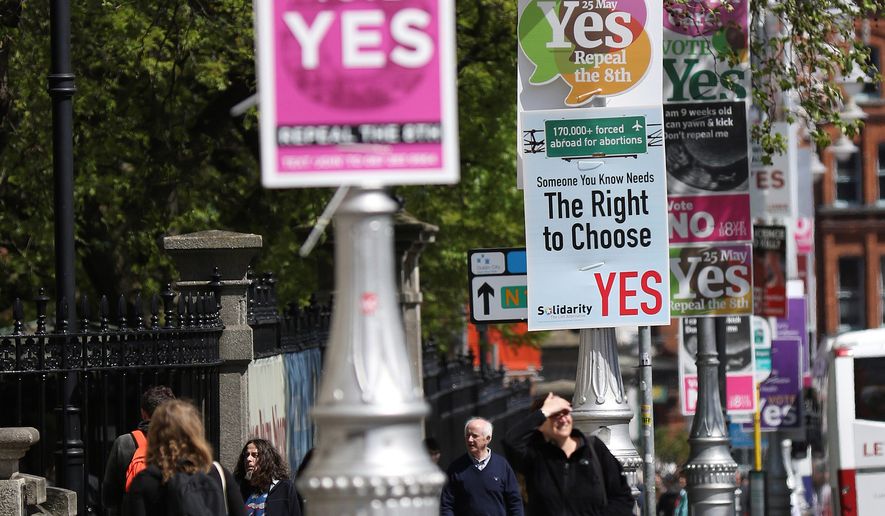A move by Facebook and Google to restrict political advertising ahead of Ireland’s fiercely contested abortion referendum Friday has outraged critics, who call it the latest example of the social media giants’ power to put a heavy digital thumb on the electoral scales — even when they strive not to get involved.
After heavy criticism of their handling of political advertising and planted false stories in the Brexit debate in Britain and the U.S. 2016 presidential race, many see the restrictions imposed ahead of Friday’s vote as a possible model for Facebook, Google and other platforms as they try to escape the political crossfire.
The restrictions are being introduced in one of the most hotly contested national votes in recent memory. Irish voters will be heading to the polls to consider easing some of Europe’s most restrictive laws on abortion.
Irish abortion opponents say the online restrictions, including Facebook’s ban on all ads on the referendum from foreign groups and fact-check stories, were clearly intended to benefit the pro-choice side.
“The truth is the Irish government and many in the traditional media have grown concerned that voters will reject their push for legalized abortion,” The Rev. Marcel de la Cruz, an Irish Catholic priest and founder of FrontPage.org, wrote in a Wall Street Journal op-ed piece Wednesday. “Social media is one of the few avenues of public outreach left to those to oppose repeal” of Ireland’s constitutional prohibitions on abortion.
The debate cuts to the heart of what industry critics call the “ticking time bomb” of social media — the murky world of unregulated digital information that shapes public perceptions based on algorithms that lack the ability to control content.
“Facebook does not know what is being advertised,” said Scott Relf, CEO of social media app PikMobile. “Google has a little more handle on it, but barely. These companies really don’t know what’s happening on their platforms, but they will not admit that.”
Mr. Relf, who oversaw the development teams that grew Sprint’s PCS/Wireless Division into a $10 billion industry, said the bottom line is that Google and Facebook should have stayed out of politics.
That hasn’t proved easy in the Irish campaign.
Still stinging from charges that it was exploited in the last U.S. presidential election by shadowy Russian groups that spread propaganda and promoted false, divisive stories, Facebook on May 8 announced that it would no longer accept referendum-related ads from outside Ireland.
The following day, Google went further, saying it would take no ad related to the referendum.
Ireland, like the U.S., has laws that regulate traditional forms of political advertising, including radio and TV. But no regulations cover social media. Abortion opponents accused Prime Minister Leo Varadkar, who supports easing the constitutional restrictions, of lobbying the social media giants to make the change.
The Transparent Referendum Initiative, a volunteer group tracking ads in the Irish abortion vote, said the bulk of the 900 Facebook ads they analyzed were placed by registered lobby groups, and most originated from inside Ireland. But several dozen were either untraceable or from overseas, including some that have been linked to U.S.-based pro-life organizations.
“It is the ultimate battle,” Mr. Relf said. “Politicians use the bully pulpit to tell Facebook and Google to behave. They then launch massive public relations campaigns to make themselves look good.”
Zuckerberg under fire
As the Irish debate plays out, Facebook founder and CEO Mark Zuckerberg has been in Europe this week defending his firm and facing tough questions from frustrated European Union lawmakers, who have generally been tougher on Silicon Valley than their Washington counterparts.
At the European Parliament in Brussels on Tuesday, the 34-year-old billionaire apologized for personal data breaches on Facebook as legislators grilled him on his firm’s inability to close false accounts and whether Facebook will comply with new EU privacy rules.
British European Parliament member Molly Scott Cato helped craft some of the questions her colleagues fired at Mr. Zuckerberg — then saw a broadcast of the hearing.
“I watched [Mr. Zuckerberg] walk in, and he looked pretty scared,” she told the publication Business Insider. “He’s totally out of his depth — he talks about setting Facebook up in college with this homey story and I’m, like, ‘Christ, this guy has the fate of European democracy in his hands and he doesn’t know what to do.’”
Liberal EU Parliament leader Guy Verhofstadt asked Mr. Zuckerberg whether he wanted to be remembered like computer legends Bill Gates and Steve Jobs who “enriched societies” or as somebody who “created a digital monster that is destroying our democracies and our societies.”
Since March, Facebook has faced withering criticism over revelations that millions of its users’ data were stolen and used to target voters during political campaigns, including the 2016 U.S. election.
On Friday, a stringent EU law, known as the General Data Protection Regulation also takes effect.
Tougher than U.S. legislation, the regulation grants Facebook’s roughly 250 million European users more control over their personal data with fines up to 4 percent of worldwide revenue for companies in violation.
Whether the Google and Facebook restrictions will become standard practice remains an open question, especially given the vastly lucrative market for political ads in large countries such as the U.S. Irish politicians said this week that they were getting a small taste of what the world may experience as social media transform the nature and content of political debate.
“We shouldn’t be naive in thinking Ireland would be immune from all these worldwide trends,” lawmaker James Lawless, technology spokesman for the opposition Fianna Fail party, told The Associated Press.
“Because of the complete lack of any regulation on social media campaigning in Ireland, somebody at the moment can throw any amount of money, from anywhere in the world, with any message — and there’s nothing anybody can do about it.”
• Dan Boylan can be reached at dboylan@washingtontimes.com.




Please read our comment policy before commenting.